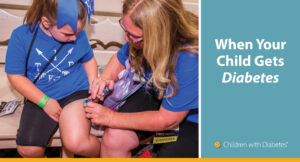Featured
Pregnancy with T1D
Pregnancy is something many young women with diabetes worry about, and often these anxieties start at a much younger age than they plan to try to conceive. It’s common for healthcare providers to share with their patients the many things that can go wrong in pregnancy with diabetes. Their motivation is to help ensure women with diabetes conceive only when it is safest for mom and baby. But these stories can also create anxiety for women with diabetes. While it is important to plan a pregnancy properly, the added anxiety may not be as beneficial as the providers intend. Luckily, […]
Read MoreAdvocacy Opportunity – Share your story!
DPAC (Diabetes Patient Advocacy Coalition) is seeking patient stories for individuals who have been negatively impacted by a Copay Assistance Accumulator Program (CAAP) included in their insurance plan. A CAAP is where a manufacturer provides a coupon to a patient to enable them to purchase a drug at retail for a discounted amount; however, the patient does not get credit towards their deductible or out of pocket maximum for the amount of the coupon by their insurance plan. The result is that the plan gets the deductible paid twice – once by the patient and once by the manufacturer through […]
Read MoreWhen Your Child Gets Diabetes
One of the biggest decisions in a person’s life is whether or when to become a parent. If you decide to become a parent, one of the things you wish for is a healthy, happy child. Sometimes, your child is healthy for most of their life aside from the normal colds, flus, and now COVID-19. But sometimes your child gets diagnosed with a chronic illness like type 1 diabetes, and it turns your whole life upside down. Where Do You Start? There are many important basic skills that should be top priority to learn within the first week of diagnosis. […]
Read MoreAnnouncing the CWD Journey Awards
Living with type 1 diabetes can be incredibly challenging and the work required for daily life deserves special recognition. As such, Children with Diabetes is excited to share that through the new CWD Journey Awards program, there will continue to be a recognition of the work required to thrive with type 1 diabetes. Medals marking 10, 25, 50, and 75 years of daily life with diabetes will serve as an inspiration to everyone in the type 1 community. Attendees of CWD’s flagship program, Friends for Life Orlando, will have the opportunity to receive their own CWD Journey Award during the exhibition hall […]
Read MoreSometimes Diabetes Can’t Take the Heat
It’s summer for those of us in the Northern Hemisphere, and with the new season comes the usual increase in temperature. Add climate change and the continuing rise in temperature on our planet into the mix, and it creates some very concerning risks for people with diabetes and other chronic conditions. These risks are even more concerning for more vulnerable populations with diabetes, such as children, elderly, and people without access to cooler temperate environments. Heat Exposure and Hospitalization for People with Diabetes Given that this is something that we will not be able to avoid in the near future, […]
Read MoreCWD Beyond Friends for Life – ADA’s 82nd Scientific Sessions
After the amazing experience everyone heard about Children with Diabetes’ (CWD) events at the Advanced Technologies and Therapeutics in Diabetes (ATTD) conference in Barcelona, many people in the diabetes professional world were asking about what events CWD was hosting at the ADA’s 82nd Scientific Sessions in New Orleans, Louisiana. Most people think of Friends for Life (FFL) when they hear Children with Diabetes or CWD, but there are many other things that the organization does to help people and families affected by type 1 diabetes. Collaborations CWD collaborates with a number of health care professionals, diabetes advocates, diabetes industry groups, […]
Read MoreDevelopments in Autoimmunity Screening: ASK Program
Autoimmunity Screening for Kids Study (ASK) is based at the Barbara Davis Center for Childhood Diabetes in Aurora, Colorado. ASK is a general population screening effort to identify children who are likely to get type 1 diabetes (T1D) or who may have undiagnosed celiac disease (CD). T1D and CD are the most common autoimmune diseases in childhood. The main goal of the ASK program is to identify children with T1D before they are sick with life-threatening diabetic-ketoacidosis, according to Dr. Kimber Simmons, MD, MS, and Cristy Geno, PhD, MPH, of the ASK Program. In the first general population-based study of […]
Read MoreCGM Alarm Fatigue
When you have a device that monitors your glucose levels as a person with type 1 diabetes, you are likely quite familiar with alerts and alarms. At diabetes events, like Friends for Life conferences, or diabetes camps, you will hear an assortment of alarms from pumps, CGMs, smart phones, etc. It can even be fun to try and pick out what beep came from what device. Less enjoyable are the alarms that we get about our own glucose levels. The feeling that we get when we get a high alert after eating something we know we probably underestimated the carb […]
Read MoreMonitoring and Treating Ketones with T1D
Ketones can be like kryptonite for people with type 1 diabetes, and the symptoms of ketone build up are often what lead to the diagnosis of T1D. People are increasingly being diagnosed in what’s known as diabetic ketoacidosis (DKA), which can be life-threatening. Understanding what ketones are, how to measure ketone levels, and what to do when you have ketones is critical to managing T1D. What are Ketones? Ketones are a biproduct of the body burning fat for energy, and for people without diabetes, this is not a problem because their body will level out the ketones. Ketones commonly occur […]
Read MoreConfronting Depression with Diabetes
Mental Health Awareness Month is here again and, with it, a reminder of how important maintaining mental wellness is for all of us. Our mental health affects our physical health, our relationships, and our quality of life.1 It also has a huge impact on diabetes management – and people with diabetes who have depression or diabetes distress are at an increased risk for having elevated HbA1c levels.2-3 What is the Relationship Between Diabetes and Depression? Studies have shown that for people with type 1 diabetes (T1D), the risk for experiencing depression is three times that of people without diabetes.4 For […]
Read More









